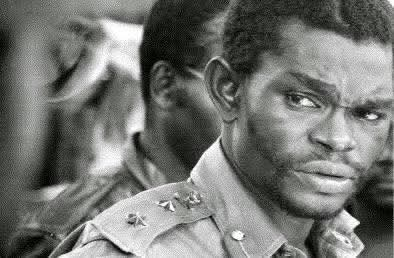
Benjamin Adekunle, Black Scorpion
Flashback: Brigadier Benjamin Adekunle – The Black Scorpion of the Nigerian Civil War
In the fiery years of the Nigerian Civil War, one name struck both fear and admiration on the battlefield Brigadier Benjamin Adesanya Maja Adekunle, famously called “The Black Scorpion.”
He was not just a soldier; he was a commanding force, known for his bold tactics, aggressive warfare, and a reputation that made him one of the most talked-about military officers of his time.
Early Life and Military Rise
Born on June 26, 1936, in Kaduna to Yoruba parents from Oyo State, Adekunle joined the Nigerian Army in 1958. He trained at the Royal Military Academy, Sandhurst (UK), and rose through the ranks due to his discipline and combat performance.
By the time the Nigerian Civil War broke out in 1967, Adekunle had already gained recognition. He was soon appointed the commander of the newly created 3rd Marine Commando Division a key unit tasked with advancing into Biafran-held territory through the difficult Niger Delta terrain.
The Black Scorpion’s Campaign
Adekunle’s division became known for its rapid coastal advances, capturing strategic towns like Bonny, Port Harcourt, Calabar, and others.
His bold leadership helped cut off Biafra’s access to the sea, severely weakening its economy and military logistics.
His nickname “Black Scorpion” came from both his fierce battlefield tactics and his no-nonsense personality.
He was admired by his men but also feared by enemies and sometimes even colleagues.
Controversies and Decline
Despite his successes, Adekunle’s career was not without controversy.
His public statements, media presence, and clashes with superiors including General Yakubu Gowon led to his replacement in 1969 by Colonel Olusegun Obasanjo.
After the war, Adekunle felt sidelined and retired from the army in 1974. He largely withdrew from public life.
Legacy
Brigadier Benjamin Adekunle is remembered as one of Nigeria’s most daring war commanders. His actions during the war continue to spark debate with some viewing him as a heroic patriot, and others as a hardline warrior.
Regardless of opinion, his impact on Nigeria’s military history remains undeniable.
Did You Know?
• He was one of the first Nigerian officers trained at Sandhurst in the UK.
• He once reportedly said, “I want to win this war and end it fast no matter what it takes.”
• Despite his fame, he lived a quiet life after retirement and died on September 13, 2014.
What do you think about the role of men like the Black Scorpion during the Nigerian Civil War?
Should we judge them by their results or their methods?
